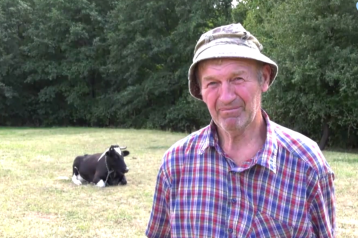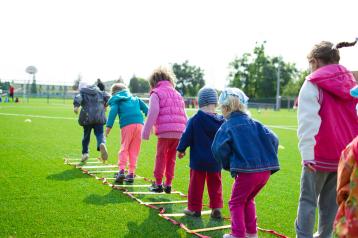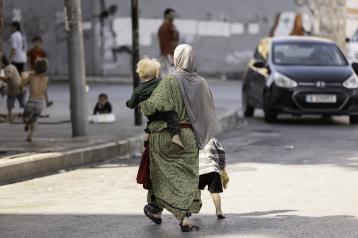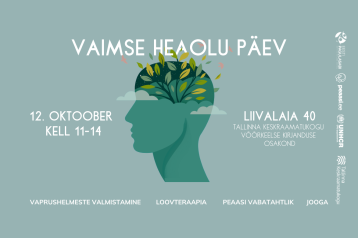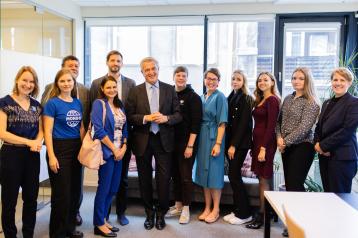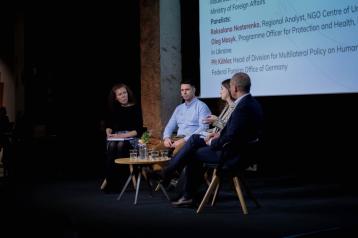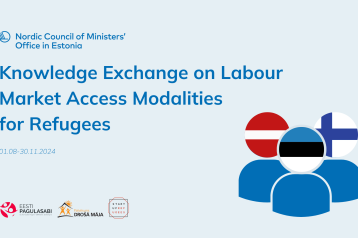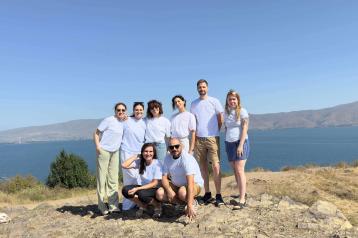- We launched a donation campaign in Estonia to provide humanitarian aid for people affected by the conflict in Lebanon.
- On 7 November, we are organising an international humanitarian conference in Tallinn, which is still open for registration. This year's conference will focus on ethical dilemmas, preventive action, and the use of artificial intelligence.
- The third season of the "Empowering Women" programme has begun in Estonia.
- We have launched a nursery school counselling programme in Estonia to strengthen inclusive learning environments.
- As part of Mental Health Month, we are organising a Mental Well-being Day in Tallinn on 12 October.
- In Ukraine, we have begun distributing winter support to cover heating costs for 4,500 households during the upcoming winter season. Assistance will be provided in cash, or alternatively, firewood or coal will be delivered directly to those in need.
- In Armenia’s Lori region, we launched a women’s livelihoods programme.
Ukraine
We provide cash-based assistance, which allows people affected by war to purchase food, medicines, hygiene products, and other essentials. As of now, we have provided cash-based assistance to over 293,000 people, totaling over 53 million euros. Cash assistance is provided for three months, with support of 3600 Ukrainian hryvnias per household member per month, equivalent to about 80 euros. Registration for assistance is carried out through Estonian Refugee Council's local registration points or via the online application platform. Currently, our focus is on assisting those in need in frontline areas in Zaporizhzhia, Donetsk, Luhansk, Kharkiv, and Kherson oblasts. The programme is funded by the European Union, the USAID's Bureau for Humanitarian Assistance (BHA), the United Nations Office for the Coordination of Humanitarian Affairs (OCHA) through the Ukraine Humanitarian Fund (UHF), and the Estonian Ministry of Foreign Affairs. Acted is the implementing partner for EU and BHA projects.
This winter, we will assist over 4,500 vulnerable households with heating aid. We are providing both financial and in-kind support to help cover rising heating costs and ensure fuel supplies for the winter. Registration and distribution of aid began in September, focusing on frontline and hard-to-reach areas in eastern and southern Ukraine—specifically in Donetsk, Kharkiv, Kherson, Luhansk, and Zaporizhzhia oblasts—where intensified hostilities and damaged infrastructure have severely hindered people's ability to meet their basic winter needs. The programme is funded by the European Union, the USAID's Bureau for Humanitarian Assistance (BHA), the United Nations Office for the Coordination of Humanitarian Affairs (OCHA) through the Ukraine Humanitarian Fund (UHF), and the Estonian Ministry of Foreign Affairs. Acted is the implementing partner for EU and BHA projects. NGO YES is the sub-implementing partner for the UHF project.
We offer vulnerable women the opportunity to participate in entrepreneurship programmes to develop or create sustainable and crisis-resilient micro-businesses. In September, 15 women who took part in the programme received in-kind support for their business development, with the total value of the support exceeding 30,000 euros. In 2024, our focus has been on women in the Cherkasy, Kirovohrad, and Poltava regions. Beneficiaries had access to a total of 117 individual mentoring sessions. The entrepreneurship programme is supported by USAID/BHA and implemented in partnership with Acted and Garage48.
In September, we supported 190 people in the Kirovohrad, Poltava, Cherkasy, Kharkiv, Mykolaiv, Zaporizhzhia, Dnipropetrovsk, and Donetsk regions through an emergency livelihood assistance programme, with a total amount exceeding 50,000 euros. The support is aimed at starting or continuing economic activities to improve self-reliance. Through this programme, we are supporting sectors related to agriculture, livestock farming, food production, and various services. The amount of support is up to 36,000 Ukrainian hryvnias, or approximately 800 euros. The programme is supported by the European Union, USAID/BHA, and implemented in cooperation with Acted Ukraine.
We are part of the Joint Market Monitoring Initiative (JMMI), through which we assist the humanitarian community in maintaining a consistent overview of market conditions and the price levels of essential goods in Ukraine. Through JMMI, we can better prepare our cash-based assistance programs and direct them to the areas where help is most needed. Our data collection scope covers Zaporizhzhia, Kherson, and Donetsk oblasts.
Estonia
We are running the "Edge Up" employability programme, aimed at people with a refugee background who wish to enter the job market or move on to a more suitable position. So far, three groups have completed the programme in Estonia and two in Latvia, with one group set to start in Estonia and two in Latvia in September. In Latvia we have partnered up with a local organisation Shelter Safe House. Each month, 10–12 people participate in the training. Registration for the programme is open. The employability programme is funded by the Interreg Baltic Sea Region Programme, with support from the European Regional Development Fund.
Registration is now open for the "Empowering Women" entrepreneurship programme. The programme is designed for all women interested in entrepreneurship across Estonia and will be conducted in both Estonian and Russian. The programme is co-financed by Swedbank, Garage48, the Estonian Refugee Council, the Estonian Association of Business and Professional Women, OBJEKT, and the European Union.
We conduct monthly adaptation support training sessions on various subjects, including healthcare and social systems, adaptation for parents and pensioners, education system, entrepreneurship, legal issues in the context of Estonia and Ukraine, the labour market, and digital skills. The training sessions take place across Estonia, both in face-to-face and online formats, and have been attended by over 8500 refugees so far.
We provide counselling by appointment at the Estonian Refugee Council office (Vambola 6, Tallinn) every day from 10 am to 5 pm. Our information hotline is open to all refugees, as well as institutions and individuals assisting them, at +372 5881 1311 (Monday to Friday from 10 am to 5 pm), and via email at counselling@pagulasabi.ee. Additionally, counselling services are available on Viber, WhatsApp, and Telegram at +372 5464 0007.
We help refugees who have suddenly lost their housing in finding emergency shelter.
We offer support person service to all beneficiaries of international protection and their family members in Estonia. Our support persons are assigned to those in need by local municipalities. The support person service is funded by the European Union's Asylum, Migration and Integration Fund (AMIF) and the Ministry of the Interior.
We organise regular group activities and community events across Estonia. This year, nearly 2800 people have participated in our community empowerment activities. Community activities are supported by the UN Refugee Agency.
The Estonian Refugee Council is organising a Mental Well-being Day on 12 October at the Foreign Language Literature Department of Tallinn Central Library (Liivalaia 40) as part of Mental Health Month. The event aims to raise awareness about the importance of mental health and offer practical ways to support well-being. More information is available on the Estonian Refugee Council's website. The Mental Well-being Day is funded by the UN Refugee Agency.
The Estonian Refugee Council is advising teachers and staff in kindergartens across Ida-Virumaa and Tallinn to help create more inclusive and integrated learning environments. The programme, which runs until the end of January 2025, is supported by the British Council in Estonia. The programme is implemented in collaboration with the British Council in Estonia as part of the "People to People Cultural Engagement" programme to promote social cohesion.
On September 18th, UN High Commissioner for Refugees Filippo Grandi visited Estonia. During his visit, Grandi and his accompanying delegation met with UNHCR partners in Estonia, including the Estonian Refugee Council, Mondo, and the Estonian Human Rights Centre, as well as refugees living in Estonia. The meeting provided an opportunity to present the future vision of NGOs working in the humanitarian aid sector and to amplify the voices of refugees residing in Estonia.
On September 20th, members of the Estonian Refugee Forum met with Minister of Social Protection Signe Riisalo to share the everyday experiences, challenges, and success stories of refugees living in Estonia. On the same day, forum members also visited the Riigikogu, where MP Maria Jufereva-Skuratovski gave them a tour of the parliament building and explained the Estonian political system. The activities of the Estonian Refugee Forum are funded by the UNHCR.
Georgia
In Georgia, we continue to work with community councils this year to strengthen civil society and provide refugees and internally displaced persons with more opportunities to make their voices heard. Meetings of the councils were held on September 7th and 14th in collaboration with the local organisation, Mtskheta-Mtianeti Regional Hub, where urgent issues, future prospects, and the situation of internally displaced persons were discussed with relevant officials. The meetings also included planning advocacy activities for the following month to ensure greater representation of refugee voices in important discussions. The community councils serve as informal representatives for individuals with refugee backgrounds. The Community Councils programme in Georgia is supported by ESTDEV – the Estonian International Development Cooperation Centre.
Our Emergency Livelihoods Programme, designed to support Ukrainian refugees, is making strides toward helping people achieve long-term self-sufficiency. By offering support to help start or continue small businesses from home, we are enabling participants to rebuild their livelihoods. As we close the application phase, we will be moving to the next stage of the programme by mid-October. The programme is supported by the Estonian Ministry of Foreign Affairs.
Armenia
In Armenia, we are implementing an environmentally friendly agriculture programme aimed at helping three schools in the rural areas of the Tavush region adopt water- and energy-efficient agricultural solutions developed in Estonia. The goal is to alleviate water scarcity, promote climate change adaptation, and provide children with environmental education. The programme is supported by the Environmental Investment Centre.
We launched a livelihoods programme aimed at women in the Lori region of Armenia. As part of the programme, 15 women with refugee backgrounds will receive support to start their businesses and generate stable income. The programme is funded by the US Embassy in Armenia.
In addition, we are still preparing for a project to establish community councils and self-help groups for refugees, enabling those from Nagorno-Karabakh to represent their views and support their independent livelihoods․
Jordan
In Jordan, our focus is on vulnerable female-led households. We are preparing for the next phase of the programme, where we will develop our training centre and provide trainings for 40 women, with support for 12 to establish hydroponic greenhouses on their own land. The greenhouses enable women to grow food for their own families or enhance their income by selling produce. Additionally, we will conduct hydroponics training for four female-led community organisations to increase knowledge of water-efficient agricultural methods in the entire region. The activities of the Estonian Refugee Council in Jordan are supported by ESTDEV – Estonian Centre for International Development.
Lebanon
In collaboration with the local organisation Nusaned, we are providing cash assistance to people in Lebanon who have fled their homes due to armed conflict, helping them meet their basic needs related to finding emergency shelter. Donations can be made through the Estonian Refugee Council's website to alleviate the humanitarian crisis in Lebanon.
